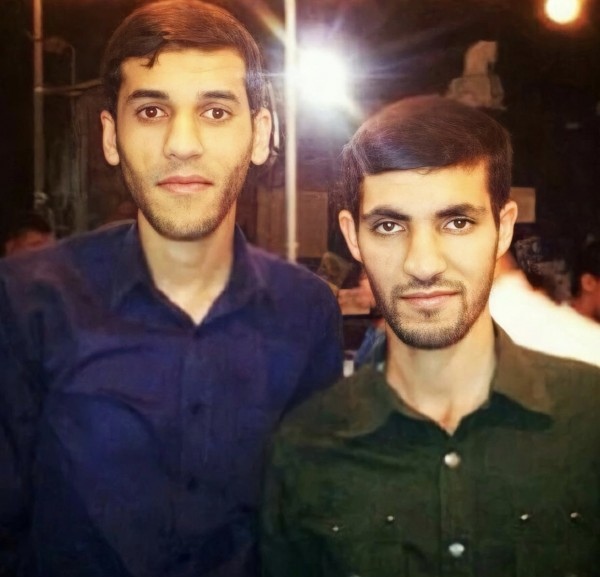Updated: On the morning of 29 May 2023, Saudi authorities carried out the arbitrary execution sentence against the two Bahraini youths, Sadeq Thamer and Jaafar Sultan, without prior notice, according to a statement issued by the Saudi Ministry of Interior.
Sadeq was a 26-year-old employee at Thamer Commercial Company at that time and Jaafar was a 23-year-old who participated in several religious and social activities. Accused of transporting and possessing explosive materials, they were both arrested without a warrant and subjected to enforced disappearance for 115 days while suffering from physical and psychological forms of torture. Their death sentence was upheld by the Saudi Court of Appeal on 11 January 2022 and by the Supreme Court on 6 April 2022.
On 8 May 2015, King Fahd Causeway Customs Saudi authorities arrested both Sadeq and Jaafar and seized their car without presenting an arrest warrant or providing a reason for their arrest. In the beginning, they were transferred inside Saudi Arabia, and 25 days after their arrest, there was a transfer operation to Bahrain. During their transfer, and while they were on the bus with a Bahraini officer, the latter received a call and went off the bus; when he returned, he began to insult and threaten them with reprisals. They were consequently returned to Saudi Arabia.
On the same day, at about 6:30 pm, Jaafar and Sadeq’s homes in Bahrain were raided by individuals in civilian clothes, wearing white clothes belonging to the Bahraini Criminal Investigations Directorate and police force. They searched the homes without presenting a warrant. They confiscated a laptop, computer, and phones belonging to Sadeq and Jaafar as well as their family members. Their parents were not informed of their arrest and knew nothing about their whereabouts.
Sadeq and Jaafar were then taken to the General Investigation Prison in Dammam, Saudi Arabia where they were placed in solitary confinement for nearly 4 months. After 115 days of forced disappearance, they were allowed to call their parents, after their family had reached out to various Bahraini and Saudi governmental entities but were not allowed to talk to them about the condition of the detention and investigations. During their first visit with their parents on 13 October 2015, Sadeq and Jaafar informed their parents that they were subjected to physical and psychological torture and pressure to confess but did not open up about the details because of the presence of their mothers. However, in court, Jaafar told the lawyer that he was tortured and threatened with bringing his family member in to torture and pressure them. Jaafar was transferred to the hospital for ten days because of the torture he was subjected to. Similarly, Sadeq told his parents that he was brutally tortured and threatened when refusing to sign the charges report and threatened to be put in solitary confinement again.
On 31 May 2016, the Bahraini Fourth High Criminal Court had previously sentenced Sadeq and Jaafar in Bahrain to life imprisonment and a fine of 200,000 Bahraini dinars, for the same incident they were convicted of in Saudi Arabia, on charges of: founding and joining a terrorist group, and possessing, acquiring and manufacturing explosives (Dar Kulaib) and training on the use of weapons and explosive materials. In Saudi Arabia, the Public Prosecution charged them with joining a terrorist cell, smuggling explosive materials, and misleading the Saudi investigation authorities, and the Saudi Specialized Criminal Court sentenced them to death on 7 October 2021.
During the interrogation period, Saudi authorities did not allow their lawyer to meet with Sadeq and Jaafar. They were not given enough time to adequately prepare for the trial nor were they allowed to present evidence.
Four special rapporteurs from the United Nations expressed their concern regarding the death sentences imposed on the two young men. They conveyed their concerns through two separate communications addressed to the Saudi government, dated 26 January and 3 June 2022. The Special Rapporteurs called on the Saudi authorities to immediately cancel the death sentences against them. They also reiterated their call for Saudi Arabia to impose an official moratorium on all executions as a first step towards the complete abolition of the death penalty in the country.
The warantless arrest of Sadeq and Jaafar by the Saudi authorities, as well as the brutal torture they endured to coerce confessions and their subsequent sentencing for charges they had previously been tried for in Bahrain, resulting in their death sentences, constitute a violation of international standards on legal procedures and guaranteed fair trial in the Convention against Torture and Other Cruel, Inhuman or Degrading Treatment or Punishment (CAT) and the International Covenant on Civil and Political Rights (ICCPR). ADHRB condemned the execution of the torture victims Sadeq Thamer and Jafar Sultan by Saudi authorities, which violates international laws. ADHRB issued a statement calling on various international and human rights entities, as well as Saudi Arabia’s ally states, to exert pressure on Saudi Arabia to halt the implementation of death sentences with the aim of abolishing them permanently. We also urge the Saudi government to hand over the bodies of the two young men to their families in Bahrain for burial in their homeland and provide compensation to the victims’ families and to cancel the ongoing executions that have been escalating without deterrence since the beginning of this year.





